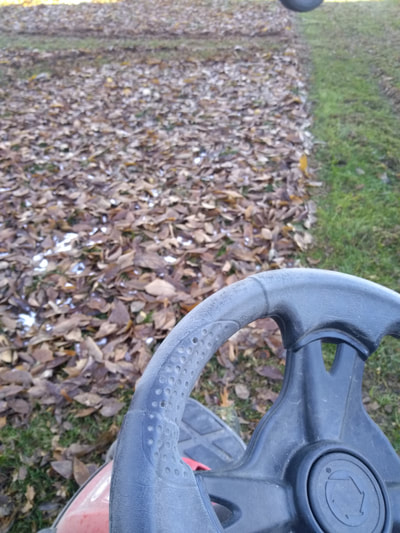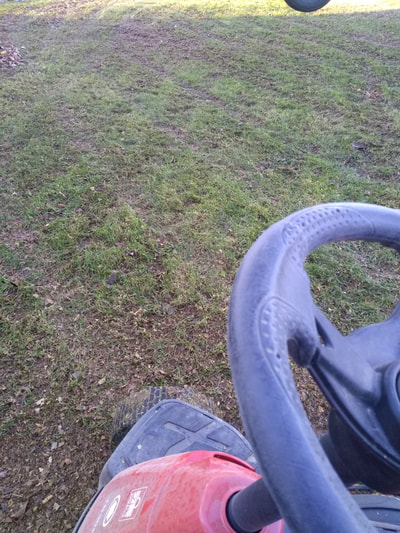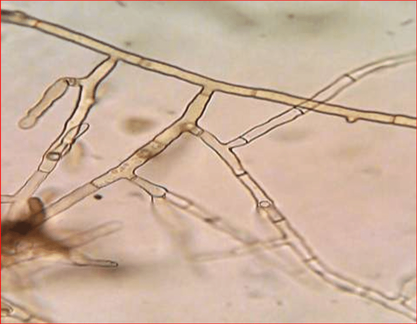 Rhizoctonia solani Rhizoctonia solani A recently-released study from an international group of scientists and researchers (link to PDF) shows that vermicompost (compost produced by worms) not only improves crop productivity, but actively fights fungal attacks that can destroy harvests. This is great news, not only for organic farmers, but also home gardeners who are looking to boost their harvest and prevent fungal outbreaks without using harmful synthetic fungicides and fertilizers. Their scientific conclusion: "The application of vermicomposting to agricultural land increases productivity by a multifaceted impact on soil health and crops, facilitating nutrient enrichment and preventing pathogen development. Vermicompost and its derivatives, such as vermiwash [liquid extract produced from earthworm-rich vermicompost], along with associated decomposer bacteria, act against fungal pathogens. The antifungal efficacy of vermicompost may be associated with bioactive compounds present in the CF [coelomic fluid], mucus, skin secretion of earthworms and metabolites secreted by decomposer bacteria. The CF of earthworms has an inherent ability to defend worms against diseases. It inhibits the growth of a variety of fungal pathogens, such as Rhizoctonia solani, Alternaria solani, Aspergillus niger, A. flavus, Fusarium oxysporum, and F. graminearum. The metabolites from vermicomposting bacteria, CF, mucus, and skin secretion synergistically combat phytopathogenic fungi. As an organic product, vermicompost and its derivatives are environmentally friendly. Thus, these products should be used to boost agricultural productivity by nutrient enrichment and reduction of plant fungal diseases." The layperson's summary: Worms which break down organic matter have to be able to fight off harmful bacterial and fungal pathogens in the soil, so they secrete fluids from their bodies to do this. These fluids are also present in the vermicompost (their poop) that we apply to the soil in our pots and gardens. Therefore the study shows that because of the composting worms' fluids present in the vermicompost, their vermicompost also acts as an antifungal agent for your plants. To order Living Worm Compost for your garden and potted plants, click here.
0 Comments
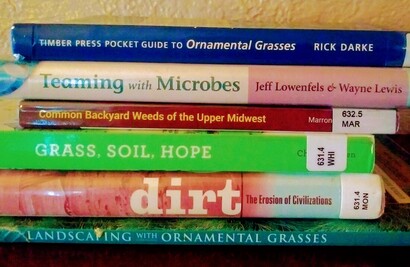 The off-season (November-March) at the Good Sweet Earth homestead is the time of year we like to recharge our batteries and expand our knowledge base. That means a little travel, a little rest, but also a lot of continuing education, research, workshops and reading. Steve (our lawn guy), has decided to focus on two areas of study this year: Learning as much as he can about common lawn weeds found in Michigan, and the physiology of ornamental grasses. That means, in addition to the usual reading about faming, soils, microbes, turf and vermicompost, he’ll be entering the 2020 growing season (hopefully!) with a whole new level of understanding of ornamental grasses and weeds, and how those relate to a healthier, more beautiful yard. So while some of our outside learning comes in the form of classes, much of it comes from good old-fashioned trips to the public library, and browsing the shelves for good books to fill the cold winter months. We thought we’d share with you some of what we’re reading this January, and how it’s informing and inspiring us as we enter a new year.
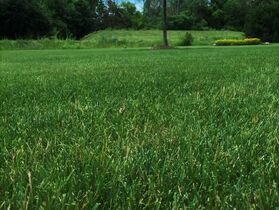 This is a Q&A blog series on healthy organic turf. If you have a question for Good Sweet Earth's lawn guy, Steve, shoot him an email at [email protected], and include "Ask the Lawn Guy" in the subject line. I got this question via email last week: Give me one good reason why I should have an organic lawn. Modern science has given us tools to have a green lawn without weeds, why shouldn't I use them? I can do better than one good reason, I can give you three. First, healthy grass comes from healthy soil. Synthetic chemical fertilizers kill your soil, which in turn kills your turf and makes it overly reliant on chemicals. Dead, sterile soil is also a breeding ground for weeds and disease. Organic fertilization focuses on feeding your soil and developing a healthy ecosystem of bacteria, fungi, worms and other life below the surface of your yard. We use vermicompost (nutrient-rich compost made by earthworms), microbial tea (a liquid rich in microbes to help break down organic matter in your soil), and all-natural slow-release fertilizers. Modern science may have convinced us we can only grow a healthy yard with synthetic chemicals, but nature itself has given us the most effective ways to grow things: water, microbes and organic matter. We've only had synthetic chemicals for our lawns for about 60 years, but things grew just fine for billions of years before that. Second, many people in the United States have made the switch to buying organic produce, yet continue to dump chemicals on their lawn and garden. There's a real disconnect there. If you're concerned with how your food is grown on a farm, you should be even more concerned with how your grass (and garden) are grown in your own yard. If you don't want your family exposed to chemicals on the foods you eat, why would you want to expose them to chemicals in your yard? Third, synthetic chemicals are destroying our ecosystem. These chemicals leach into our watersheds, they kill the life found in our lakes, rivers and streams, they cause algae blooms, and ultimately introduce poisons into our environment. Organic soil management practices can reduce the effects of climate change by helping soil hold on to carbon more effectively. This type of healthy soil management doesn't have to be limited to farms, it needs to start right in each of our yards. In fact, lawns cover more acreage in the United States than any other crop. That means the management practices adopted by homeowners could have a larger impact on our nation's soil and climate than the actions of our farmers. If you live in Kent, Ottawa, Allegan or Muskegon Counties in West Michigan, and you'd like to learn more about organic lawn care for your own home, give us a call at 616-594-0693 or email us at [email protected]. 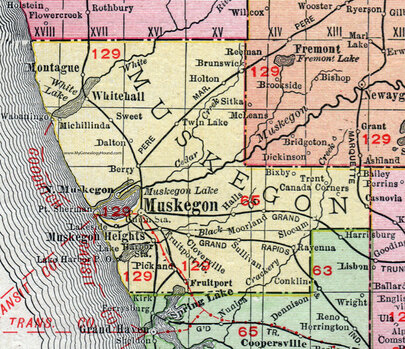 Good news, Muskegon County residents! Good Sweet Earth isn't just serving the counties of Kent, Allegan and Ottawa anymore. Starting in 2019, we're expanding our service area north along the lakeshore to cities and townships in Muskegon County. If you live in Muskegon, Norton Shores, Whitehall, Roosevelt Park, Casnovia, Fruitport, Montague, Ravenna, or any neighboring community, and you'd like to feed your turf and soil organically, we'd love to come out and give you a free consultation for lawn care. But why go organic on your lawn? First, healthy grass comes from healthy soil. Synthetic chemical fertilizers kill your soil, which in turn kills your turf and makes it overly reliant on chemicals. Dead soil is also a breeding ground for weeds and disease. Organic fertilization focuses on feeding your soil and developing a healthy ecosystem of bacteria, fungi, worms and other life below the surface of your yard. We use vermicompost (nutrient-rich compost made by earthworms), microbial tea (a liquid rich in microbes to help break down organic matter in your soil), and all-natural slow-release fertilizers. Second, many people in the United States have made the switch to buying organic produce, yet continue to dump chemicals on their lawn and garden. There's a real disconnect there. If you're concerned with how your food is grown on a farm, you should be even more concerned with how your grass (and garden) are grown in your own yard. Third, synthetic chemicals are destroying our ecosystem. These chemicals leach into our watersheds, they kill the life found in our lakes, rivers and streams, they cause algae blooms, and ultimately introduce poisons into our environment. Organic soil management practices can reduce the effects of climate change by helping soil hold on to carbon more effectively. This type of healthy soil management doesn't have to be limited to farms, it needs to start right in each of our yards. In fact, lawns cover more acreage in the United States than any other crop. That means the management practices adopted by homeowners could have a larger impact on our nation's soil and climate than the actions of our farmers. If you live in Kent, Ottawa, Allegan or Muskegon Counties in West Michigan, and you'd like to learn more about organic lawn care for your own home, give us a call at 616-594-0693 or email us at [email protected]. If you can remember back to this spring, you'll recall we had some very cold, icy weather well into April. That late blast of winter pushed the spring bloom back a couple weeks for a lot of plants, including for our magnolia tree.
It seems that magnolia wanted to get all it could out of this season since it got such a late start on things, because it also decided to drop its leaves late this year too. Today I was finally able to take care of those leaves. And it was a great day for my lawn. I always tell anyone who will listen that they should mulch mow their lawn, all season long. That means, from the first mow of spring through the final leafy mow of the fall, take that bag off your mower and let those clippings stay on your lawn. Making sure you mulch those leaves in the fall (instead of raking them up) is especially important, because they do so much for your turf. First, those mulched leaves provide a home for critters-- both the macrobial and microbial populations in your yard. They allow beneficial bugs and fungi and bacteria and other critters to overwinter more effectively. A healthy turf relies on those living things, so we should be doing everything we can to make sure they're taken care of on our lawns. Second, those mulched leaves are nature's fertilizer. They break down and release nutrients into the soil which your lawn needs for growth. Then as they break down, they turn into compost for your soil. Soil with a healthy level of compost (organic matter) holds both water and nutrients more effectively, which helps your lawn stay healthy all year long (even in the blazing hot summer and frigid winter). Finally, those mulched leaves serve as insulation for your turf over the winter. Think of that thin layer of chopped up leaves as a blanket for your yard, which means your grass won't suffer as much through the harsh west Michigan winter. In some cases, you may have to run your mower over those leaves two or three times to get the particles small enough for you to be comfortable with. But the extra bit of mowing will be worth it in the spring. In some parts of our yard, I don't even bother to mulch the leaves. I just let them overwinter at full-size, and then in the spring I mulch them up for an early-season lawn feeding. If you've got a smaller yard, or neighbors who might cast judgement upon you, I don't recommend just leaving the leaves, however. Mulch 'em. But if you've got areas of your yard where you just don't care about a little unsightly leaf cover, I say let them go until April. They'll do what nature intended: Cover and feed the soil. (One word of warning: If you've got a really thick leaf cover on your lawn, or you've got big heavy leaves, like from a magnolia tree, you're gonna want to do at least one pass with the mower, otherwise the blanket will be too thick, and may smother your grass or encourage mold.) |

